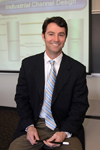October 29, 2008

Tom De Carlo. Download image.
• Medical equipment and supplies distribution
• Nationally unique UAB business program
• Career track in exponential-growth industry
BIRMINGHAM, Ala. - The University of Alabama at Birmingham (UAB) Medical Equipment and Supplies Distribution, or sales, program has it graduates well positioned ahead of a forecasted U.S. recession that could last well into 2009. The program's director, Tom DeCarlo, Ph.D., professor of Industrial Distribution, said the degree is placing students on a career track forecasting exponential growth in the coming years.
The Health Industry Distributors Association (HIDA) estimates 67 percent growth in the health care industry over the next decade as the country's baby boomers age, leading to a total of more than 70 million Americans aged 65 or older by 2030. For 2009 alone, health care industry leaders attending HIDA's October MedSurg Conference in Chicago predicted growth of 6.8 percent. The industry's growth estimates come as the country's retail industry is forecasting negative growth for the same time period.
"People will continue to get sick, have accidents and visit the doctor, regardless of the economy," DeCarlo said. "As a result, demand for medical supply companies' products will continue to grow, and those companies will need qualified professional sales people to move those products.
"That is the goal here in the UAB School of Business, to produce highly qualified, highly specialized professionals that have a practical understanding of the equipment and supplies they are distributing to the country's hospitals and doctors," DeCarlo said.
DeCarlo called UAB's medical distribution program unique in the nation, because its business students are offered unprecedented access to the doctors and medical professionals working in the university's health system, ranked in the top 30 nationally for research funding.*
"Dr. Mark Hadley, a well-respected neurosurgeon and professor of Surgery here at UAB, is also an instructor for our Medical Equipment and Supplies Distribution Program," DeCarlo said. "No other business school can offer their professional, medical sales students access to such highly qualified experts from the industry they'll be working and specializing in after graduation."
DeCarlo said the program's health care industry focus goes beyond its selection of professors and instructors. Career-appropriate classes, including opportunities to observe UAB professors in surgery and role play in sales settings with UAB doctors, offer students direct, real-world experiences that lay a critical foundation of understanding.
"With the demand for these kinds of jobs so high, interest in this career track could grow," DeCarlo said. "So we at UAB are dedicated to being on the leading edge of education in this field, and I think the classes we offer reflect that."